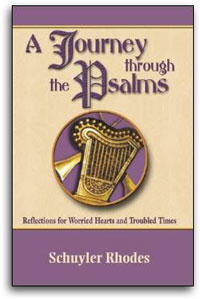Psalm 95
Preaching
A Journey Through the Psalms: Reflections for Worried Hearts and Troubled Times
Preaching the Psalms Cycles A, B, C
Object:
In democratic culture, individualism reigns supreme. Each man and woman is trumpeted as master of his or her destiny and is free to pursue happiness as they deem fit. It is this kind of cultural assumption that lies behind the question that gets asked of every six-year-old, "What do you want to be when you grow up?" The answers that come are delightful, of course. Beaming parents field answers like, ballerina, firefighter, police officer, and a hundred other options. But the operative assumption in this ritual is that each of these six-year-old children has a better than even chance of becoming anything they desire.
Before the fall of the Soviet Union and the demise of its client states, a group of children in an elementary school in Dresden, Germany, were asked the same question, "What do you want to be when you grow up?" Instead of a response, there was a stony, mystified silence in the room. "What do I want to be? What's that got to do with anything?" As it turned out, such a question focusing on the fulfillment of individual desires or wants was so alien that it never even occurred to these children. The question these children were asked was not what they wanted, but instead what did their nation need? To devote one's life energy to pursuing a personal goal was thought in this culture to be selfish, even destructive.
These two poles of individual and communal orientation lead directly to the reading of this wonderful psalm. Here is a full-blown explosion of praise to the creator God! All stops are pulled out in favor of a glorious, passionate expression of praise. It doesn't even matter if the choir is on key. Just make a joyful noise! Give glory and honor to God! Enter God's presence with thanksgiving!
In short, the psalm is a powerful utterance that speaks the location of allegiance. Here there are no individual desires staked out with prayer requests. Neither are there calls to communal commitment, wondering what the collective needs most. No, instead the writer simply lays out an ultimate commitment to God.
So it is that a person of faith, whether growing up in middle-class USA or the worker's paradise of the German Democratic Republic would not be concerned with either individual or collective needs. Instead, the person of faith who shouts out God's praise and dances with a passion for the Lord asks quite another question altogether. Indeed it is formed more like a prayer than a question.
It's not what I want, God, nor is it what the state expects. But in all things, Lord, let me be led by you. Amen.
Before the fall of the Soviet Union and the demise of its client states, a group of children in an elementary school in Dresden, Germany, were asked the same question, "What do you want to be when you grow up?" Instead of a response, there was a stony, mystified silence in the room. "What do I want to be? What's that got to do with anything?" As it turned out, such a question focusing on the fulfillment of individual desires or wants was so alien that it never even occurred to these children. The question these children were asked was not what they wanted, but instead what did their nation need? To devote one's life energy to pursuing a personal goal was thought in this culture to be selfish, even destructive.
These two poles of individual and communal orientation lead directly to the reading of this wonderful psalm. Here is a full-blown explosion of praise to the creator God! All stops are pulled out in favor of a glorious, passionate expression of praise. It doesn't even matter if the choir is on key. Just make a joyful noise! Give glory and honor to God! Enter God's presence with thanksgiving!
In short, the psalm is a powerful utterance that speaks the location of allegiance. Here there are no individual desires staked out with prayer requests. Neither are there calls to communal commitment, wondering what the collective needs most. No, instead the writer simply lays out an ultimate commitment to God.
So it is that a person of faith, whether growing up in middle-class USA or the worker's paradise of the German Democratic Republic would not be concerned with either individual or collective needs. Instead, the person of faith who shouts out God's praise and dances with a passion for the Lord asks quite another question altogether. Indeed it is formed more like a prayer than a question.
It's not what I want, God, nor is it what the state expects. But in all things, Lord, let me be led by you. Amen.


